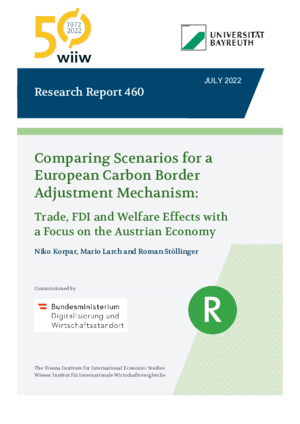Comparing Scenarios for a European Carbon Border Adjustment Mechanism: Trade, FDI and Welfare Effects with a Focus on the Austrian Economy
Niko Korpar, Mario Larch and Roman Stöllinger
wiiw Research Report No. 460, July 2022
96 pages including 15 Tables and 8 Figures
As the European carbon border adjustment (CBA) mechanism is high up on the European Commission’s agenda and soon to be implemented, it is important to understand the economic and environmental implications of alternative designs of such a mechanism. To this end and with a view to informing the decision-making process, this study analyses and compares a series of alternative scenarios, which differ along several dimensions of a potential CBA mechanism. Two main scenarios are defined: the first one is labelled ‘future ETS price scenario', which assumes a carbon price of EUR 44 and a continuation of the current practice of free allowances; the other is labelled ‘IMF carbon tax scenario’ and assumes a carbon price of EUR 67, which is taken from a recent publication by the IMF, and that free allowances in the industries by the CBA mechanism are abandoned. The scenario analyses rely on the multi-sector quantitative trade model by Larch and Wanner (2017) for trade and on the quantitative FDI model by Anderson et al. (2019). Overall, we find relatively small effects on EU exports, GDP and CO2 emissions. These small quantitative changes at the aggregate, however, mask larger changes at the sectoral level. As expected, the CBA mechanism is more effective when designed in a comprehensive manner, including export rebates in addition to carbon border taxes. The greater economic and environmental effectiveness of such a comprehensive design must be weighed against a heightened legal risk and fiercer opposition by developing countries which perceive the CBA mechanism as ‘green protectionism’ in disguise.
Keywords: Carbon border taxes, carbon tariffs, carbon leakage, climate change
JEL classification: F13, F14, F17, F18, Q56
Countries covered: Austria, European Union, The World
Research Areas: International Trade, Competitiveness and FDI
